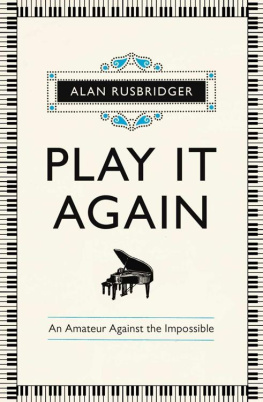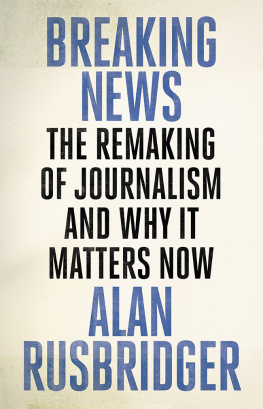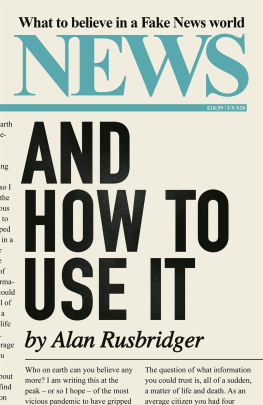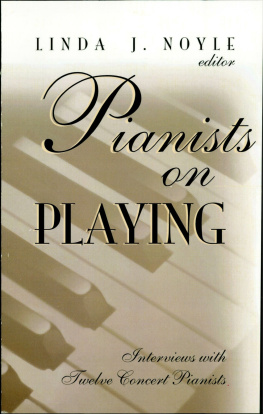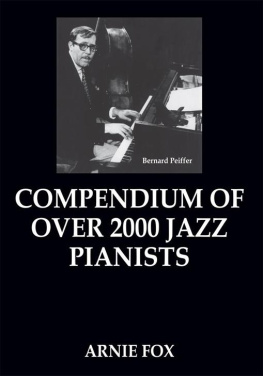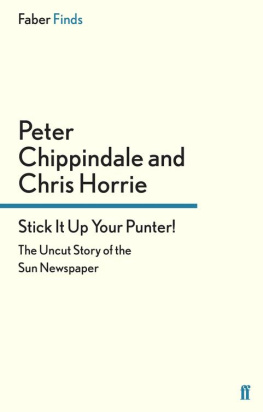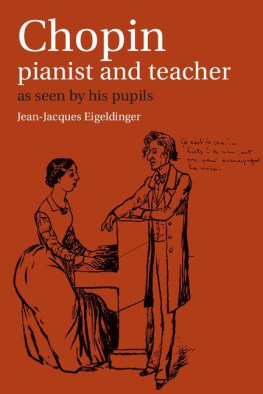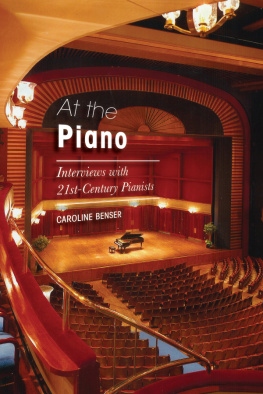CONTENTS
About the Book
As editor of the Guardian, Alan Rusbridgers life is dictated by the demands of the 24-hour news cycle. It is not the kind of job that leaves much time for hobbies.
But in the summer of 2010, he managed to make his annual escape to a piano camp. Here, inspired by another amateurs rendition, he set himself an almost impossible task: to learn, in the space of a year, Chopins Ballade No.1, a piece with passages that demand outstanding feats of dexterity, control, memory and power a piece that inspires dread in many professional pianists.
His timing could have been better.
The next twelve months were to witness the Arab Spring, the Japanese tsunami and the English riots, and were bookended by the Guardian breaking two remarkable news stories: WikiLeaks and the News of the World hacking scandal. It was a defining year in the life of the Guardian and its editor, and one of the most memorable in the history of British journalism.
Such was the background against which he tried to carve out twenty minutes practice a day, find the right teacher, the right piano, the right fingering even if that meant practising in a Libyan hotel in the middle of a revolution. Fortunately, he was able to gain insights and advice from an array of legendary pianists, from theorists, historians and neuroscientists, from a network of brilliant amateurs unearthed online, even occasionally from secretaries of state.
But was he able to play the piece in time?
About the Author
Alan Rusbridger is Editor in Chief of the Guardian and a keen amateur musician. After reading English at Cambridge he started on a local newspaper and tried his hand at a range of journalistic jobs including reporter, columnist, critic, foreign correspondent, magazine editor, features editor and, from 1995, editor. During his time editing the Guardian the paper has won numerous awards and has grown to be one of the three largest online newspapers in the world. He led the papers coverage of the secret Wikileaks cables and the Guardians campaign to get at the truth about phone hacking, which led to numerous resignations, the closure of the News of the World and the Leveson Inquiry into the culture, practice and ethics of the British press.
As a boy, he was a cathedral chorister, a reasonable orchestral clarinetist and a very mediocre pianist. He failed to be a world-class conductor, abandoned the organ and put his clarinets in the attic. In his late 40s he restarted piano lessons and tried to make up for more than 30 years of missing technique. Since then, he has moved from very mediocre to mediocre.
To my late mother, Barbara Rusbridger, who forced me to practise and who told me that music would lead to friendship. She was right.
Play It Again
An Amateur Against the Impossible
Alan Rusbridger

INTRODUCTION
THIS ALL BEGAN with Gary.
We were a group of strangers, who had come to the Lot Valley in central France to play the piano for a week; keen amateurs all. There was Stuart, the retired stockbroker; Liz from Manchester, who miraculously combined teaching, nursing and bringing up five kids; Fiona, the psychotherapist; John, the engineer; James, the paint company middle manager; Martin, the senior arts fund-raiser; Wendy, the clinical physiologist. And Gary.
Gary seemed the outsider a little awkward, unfinished around the edges; at times distant, melancholy; troubled even. There had been hints about Garys life time spent as a Manchester cab driver; anecdotes about a pub hed once run. And now, hed produced business cards for his latest venture: a website for leather and PVC clothes. (Theres leather, he would say knowingly over dinner one night, and then theres... leather.)
A couple of days into the course, hed broken off his masterclass an overambitious attempt at some Liszt saying he felt unwell. He was more than unusually withdrawn in the run-up to his final recital, when the nine of us played to each other. But then, on the last evening, he sat down and played Chopins Ballade No. 1 in G minor, Op. 23.
In that bare stone-floored room in the Lot Valley, we were all transfixed. Garys fingers seemed possessed. His customary sense of distraction had been replaced by complete absorption. He was playing one of the most complex and technically demanding pieces in the canon, and he was playing without the score, as if carrying the music inside him. All the hesitancy from earlier in the week had vanished. Something about this music had totally transformed Gary. As the piece picked up, moving into orgiastic furies of blurred finger-flying magic, Gary kept pace. Most of the notes were there and in the right place. The final Presto was both demonic and dramatic. The last converging octaves crashed out defiantly. Hed done it! An amateur pianist no better than any of us had just knocked off one of the most daunting pieces in the piano repertoire. There was a moment of stunned silence. Gary turned round and looked a little sheepishly at us. And then the audience of eight burst into amazed applause.

A week or so later, I was packing for our annual August holiday in Italy, when at the last minute I found myself slipping a score of the Ballade into my suitcase. In our rented farmhouse, there was a cheap upright piano and, one day the house was empty and with no danger of being overheard I tentatively tried to pick my way through this formidable piece. Id known the Chopin Ballades since university, but it had never before occurred to me to try to play any of them. In mountaineering terms, it would be akin to a middle-aged man deciding to climb the Matterhorn something a few obsessive and foolhardy amateurs do, indeed, attempt, but fraught with peril.
I was the archetypal amateur whod returned to the piano in middle age. My musical education had begun at the age of 6, when I joined the church choir. By 8, I was learning the piano. By 10, I had taken up the clarinet too, and then joined the cathedral choir at Guildford. For the next three years, I had a rather extraordinary immersion in music, with a rigid daily timetable of piano and clarinet practice, alongside choir rehearsals and church services.
I changed schools at 13, and arrived at Cranleigh School in Surrey then a middle-of-the-road private school where, for the next five years, singing and piano took a back seat to an intensive concentration on the clarinet. If, as the scientific consensus now apparently has it, it takes 10,000 hours to become expert in piano playing by the age of 18, I had missed the mark by a good 8,000 hours. I mucked around on the piano often playing duets with friends up to and including my days as a cub reporter on the Cambridge Evening News. Wherever I was living, I would enlist as a clarinettist in the local amateur orchestra, and seek out people who were up for piano duets. At Cambridge I rented pianos all through my undergraduate years. But I think I can safely say that I never seriously practised a single piano piece during my three years there. I certainly played a lot but I was, at best, a pianist endlessly replaying the few pieces I knew from school.
When I was about 19 I had a girlfriend, Ros, whose father was a slightly forbidding headmaster, a big gruff bear of a man, who seemed a rather nineteenth-century figure. Ros parents had a grand piano in their sitting room and a few volumes of music, including some Chopin, which I would pick away at of an afternoon. To this day I remember her father challenging me on my opinion of Chopin. He demanded to know whether I took the fashionable view that Chopin was a sentimentalist.
Next page
